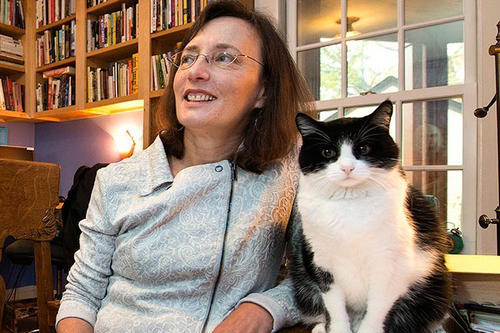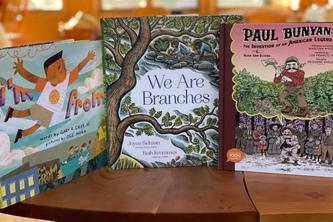
A funny thing happened to Julie Schumacher on the way to writing her latest book.
Starting out to see if one could build a novel solely from letters of recommendation, she ended up writing “Dear Committee Members,” which in September won the coveted Thurber Prize for American Humor.
“I don’t think of myself as a comic writer,” says Schumacher, a professor of English at the University of Minnesota. “To me, it’s a novel.” Nevertheless, “it was a total thrill, because a woman had never won a Thurber Prize.” She picked up the award at its announcement ceremony, in Caroline’s Comedy Club, New York City.
To Schumacher’s knowledge, “Dear Committee Members” is the first novel composed of letters of recommendation. Each spews from the finely honed pen of Jason “Jay” Fitger, a curmudgeonly creative writing professor at the aptly named Payne University, somewhere in the Midwest. Fitger’s letters gleefully poke at the soft underbelly of academia while revealing their author’s concern for a particular graduate student—whose literary journey, or lack thereof, forms the spine of the story—as well as Fitger’s matchless proficiency at shooting himself in the foot.
For example, says Schumacher, “I wanted to find a way [Fitger] could go all out and talk about his lackluster sex life.” And so he does, in one particularly ill-advised missive.
In winning the Thurber Prize, Schumacher outdid two other finalists: comic actress/novelist Annabelle Gurwitch, nominated for “I See You Made an Effort: Compliments, Indignities, and Survival Stories from the Edge of 50,” and New Yorker cartoonist Roz Chast, nominated for the graphic memoir “Can’t We Talk About Something More Pleasant?”
The book also won the Midwest Booksellers Choice Award, given by independent bookstores in the Midwest to one book in each genre that they most enjoyed selling.
A novel novel
The idea for the book came to Schumacher about two years ago, as she was telling students in her undergraduate fiction class about fiction’s many forms.
“I said, ‘You can start a short story with a to-do list, a series of postcards, emails to friends—that sort of thing,” she recalls. “Then they asked me, ‘What would you choose?’ I said, ‘Probably letters of recommendation, because I write so many for you guys.’”
She didn’t take the idea too seriously until she told the story to colleague John Watkins, who responded that she should give it a try. And why not?
“It seems crazy, all of us writing so many letters of recommendation and mailing them to each other,” Schumacher muses. “The letter of recommendation remains semi-sacred, yet formulaic and dull.
“I realized that for a novel to work in this form, I would need to create a narrator who would tell about himself. He would have to be an egoist, wildly inappropriate, with an axe to grind.”
Fitger fits that description admirably as he aims his venom at those he holds responsible for the lowly status of the arts and humanities at Payne. But despite the numerous and often hilarious flaws in his character, his struggles resonate with much of the academic—and human—experience.
“I have a little bit of Fitger in me,” Schumacher confesses. “I want to champion the arts and humanities, and I’m skeptical of a lot of technological razzle-dazzle. It’s a sad book as well as a comic one.”
The bouquets keep coming
“Dear Committee Members” churned up a hubbub that shows no sign of abating. At some point in the coming year, Schumacher will give a presentation at the Thurber House, former home of legendary humorist (and prize namesake) James Thurber, in Columbus, Ohio. And in January, a regional community theater in Portland, Oregon, will present a one-man show based on the book.
Perhaps the best afterword in the novel is Schumacher’s acknowledgment of political science professor Lawrence Jacobs. She calls him the “world’s most enthusiastic and supportive spouse, who read the first draft of this book and said, ‘I’m glad we have different last names.’”
Schumacher’s other writings include the novel “The Body is Water,” the short story collection “An Explanation for Chaos,” and five books for younger readers.
- Categories:
- Arts and Humanities





